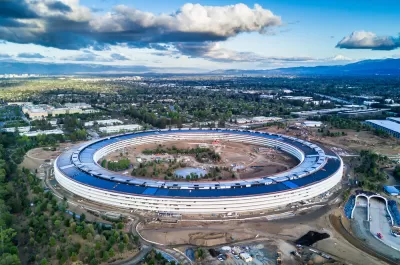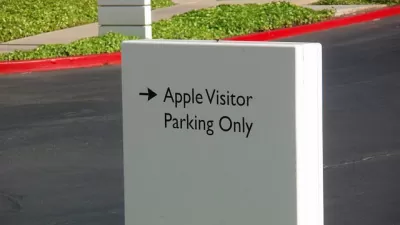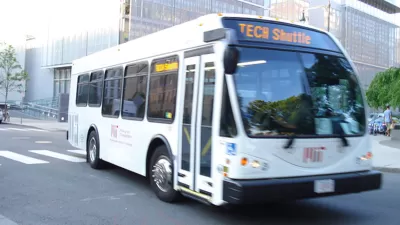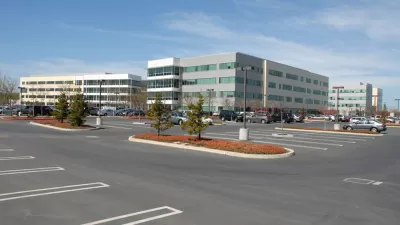Apple's new campus contains thousands of parking spaces, but neither transit options nor daycare.

Apple anticipates only about 10 percent of the employees that will work in its new headquarters will live in Cupertino, the city where Apple's headquarters was built. This is an old fashioned approach to building an office campus. "By moving out of downtown skyscrapers and building in the suburbs, corporations were reflecting 1950s ideas about cities—they were dirty, crowded, and unpleasantly diverse," Adam Rogers argues in Wired.
The location and purpose-built nature of the building make it unsuited to evolve. "If Apple ever goes out of business, what would happen to the building? The same thing that happened to Union Carbide’s. That’s why nobody builds these things anymore," writes Rogers. To ease the concerns of the city's mayor, Apple will contribute hundreds of thousand of dollars to Cupertino and neighboring cities in parking restitution, but urbanists had hoped they would have invested in other transit. "The company could have chipped in to double the frequency of CalTrain’s commuter rail. It could have built a transit center in Cupertino, which, unlike Mountain View and Palo Alto, has none."
FULL STORY: IF YOU CARE ABOUT CITIES, APPLE'S NEW CAMPUS SUCKS

Maui's Vacation Rental Debate Turns Ugly
Verbal attacks, misinformation campaigns and fistfights plague a high-stakes debate to convert thousands of vacation rentals into long-term housing.

Planetizen Federal Action Tracker
A weekly monitor of how Trump’s orders and actions are impacting planners and planning in America.

In Urban Planning, AI Prompting Could be the New Design Thinking
Creativity has long been key to great urban design. What if we see AI as our new creative partner?

King County Supportive Housing Program Offers Hope for Unhoused Residents
The county is taking a ‘Housing First’ approach that prioritizes getting people into housing, then offering wraparound supportive services.

Researchers Use AI to Get Clearer Picture of US Housing
Analysts are using artificial intelligence to supercharge their research by allowing them to comb through data faster. Though these AI tools can be error prone, they save time and housing researchers are optimistic about the future.

Making Shared Micromobility More Inclusive
Cities and shared mobility system operators can do more to include people with disabilities in planning and operations, per a new report.
Urban Design for Planners 1: Software Tools
This six-course series explores essential urban design concepts using open source software and equips planners with the tools they need to participate fully in the urban design process.
Planning for Universal Design
Learn the tools for implementing Universal Design in planning regulations.
planning NEXT
Appalachian Highlands Housing Partners
Mpact (founded as Rail~Volution)
City of Camden Redevelopment Agency
City of Astoria
City of Portland
City of Laramie





























